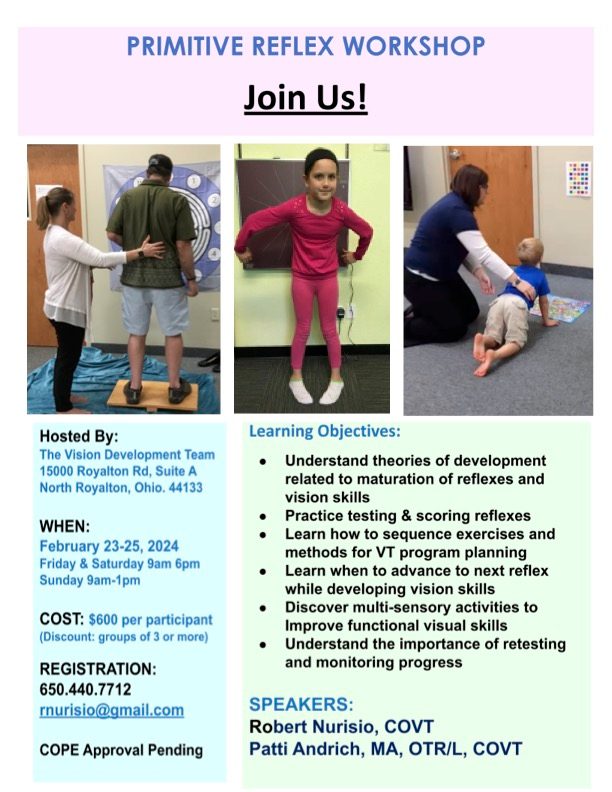Behavioral Optometry certainly has it’s naysayers, with most Ophthalmologists hovering near the top of the list. For two professions that would seem from a distance to make natural allies, the strife between Ophthalmology and Optometry continues. It’s a battle that has never really made sense to me, but by playing a little “tit for tat”, some truth may be revealed.
How many times have you heard this from the parent of a strabismic patient?
“My Ophthalmologist said Vision Therapy wouldn’t work, it’s just a waste of money and there are no studies to prove Vision Therapy works on Strabismus. He/she said the only good solution is surgery. They said if we do surgery before my child turns 6, chances for success are higher”
So let’s just break this statement down a bit, and examine the parts, because the language tells the story.
My Ophthalmologist said Vision Therapy wouldn’t work: To what end? If the goal is fixing the cosmesis by noon tomorrow, then they are correct, Vision Therapy cannot do that. If the goal is normal binocular vision thorough non-invasive procedures, then good doctor, I would tend to disagree. Since most Ophthalmologists don’t prescribe, practice or even believe in Vision Therapy, how have they suddenly become the experts on its success rate? An Ophthalmologist saying Vision Therapy won’t work to build equality between the eyes is equivalent to a Pediatrician stating Occupational Therapy will be unsuccessful in building equality between the hemispheres of the body. It’s just not true.
It’s just a waste of money: Simply put, this is a guilt trip based on societal influence that having money somehow makes you special. From one parent to another, how is seeking interventions that do not require anesthesia and a blade a waste of anything? We have all heard the horror stories of surgery gone wrong, and while we wouldn’t wish such circumstances on our worst enemy, the thought does roll around in our brains as a possible outcome. And if God forbid, your child is the one who has an adverse neurological reaction to the anesthesia, your pocketbook will be the least of your worries. The truth is, most of us would beg, borrow and steal for our kid’s happiness. I know I would.
There are no studies to prove Vision Therapy works on Strabismus: Maybe not, but the absence of evidence is not evidence of absence. Besides, how many studies have been published proving that a Vision Therapy program prescribed and carried out by a Behavioral Optometrist was an unsuccessful treatment of strabismus. To my knowledge, zero.
My Ophthalmologist said the only good solution is surgery: Perhaps, but perhaps not. Curiously and continually omitted though, is the middle of that statement – “He/she said the only good solution Ophthalmology can offer is surgery” – because they cannot offer what they do not have. If the doctor had my child’s best interests and long term health in their heart, why wouldn’t they recommend a less invasive plan first (i.e. Vision Therapy), followed by more aggressive steps when necessary? Seems to be equivalent of treating a headache with a lobotomy, when Advil may do the trick.
They said if we do surgery before my child turns 6, chances for success are higher: So, what’s the rush? Why not try Vision Therapy at 6, and if unsuccessful, have surgery at 8? Does surgery really work better on 6 year olds, than it does on 10 year olds? If this was the case, doesn’t prudence demand we stop performing this type of surgery on anyone over 6 years old? Perhaps what they meant to say is “if we do surgery before age 6, that gives Ophthalmology plenty of time to claim a ‘growth spurt’ as the reason repeat surgery is necessary“. Just saying.
This topic always fires me up because it is a clear demonstration of a profession taking advantage of the public’s ignorance. I know Vision Therapy cannot fix every case of strabismus, and in those times surgery is the solution. But to dismiss a less invasive solution simply because said solution is not your solution, that is just not right.
If your cardiologist recommended open heart surgery at the first sign of high blood pressure, you’d look for a different opinion. Hopefully patients with strabismus do the same.




Leave a comment